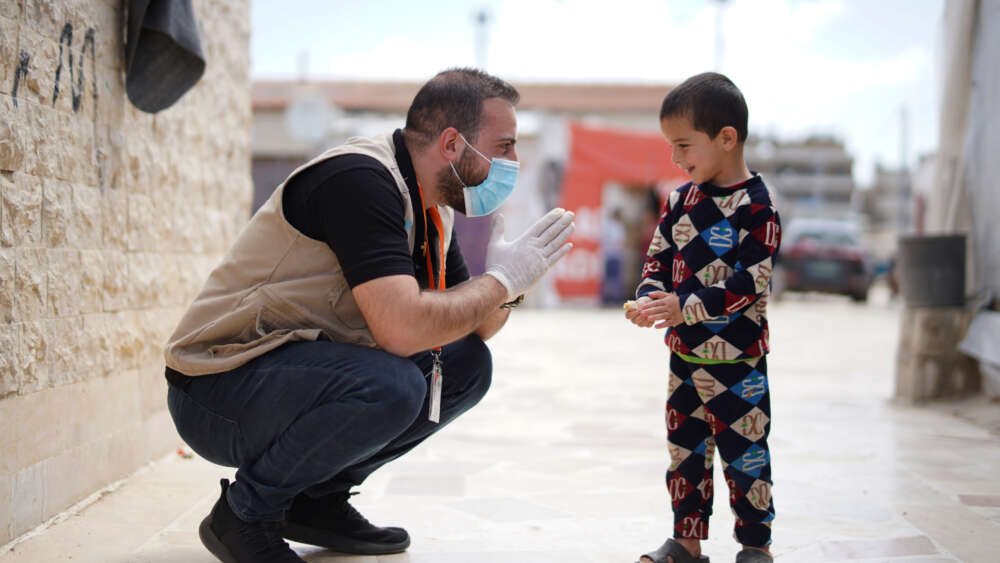Australian aid agencies are coming together to form an alliance that will mean a faster and more effective response to overseas disasters.
And with the latest Intergovernmental Panel on Climate Change (IPCC)report released this week, which put the world on “Code Red” alert to the threat of global warming, it couldn’t have come at a better time.
Accelerated global warming is predicted to fuel more floods, heatwaves, droughts and wildfires in the coming decades. As the new director of the Emergency Action Alliance (EAA), Kerren Morris says, “Around the globe, the number of large scale disasters are increasing. The complexity of these emergencies are also accelerating, and new factos such as the Covid pandemic mean that communities are even more vulnerable.”
We put the people in need ahead of our own organisation’s brand and data gathering – Melissa Lipsett, Baptist World Aid
It’s no surprise, then, that the need for disaster responses is also escalating.

Kerren Morris is the Executive Director of the new Emergency Action Alliance Emergency Action Alliance
The Emergency Action Alliance (EAA) was launched last week to address this issue, with sixteen member agencies including many of Australia’s largest Christian aid organisations like World Vision, Tearfund, Caritas, CBM (formerly Christian Blind Mission), Act For Peace, Anglican Overseas Aid, ADRA (Seventh Day Adventist), Baptist World Aid and the Australian Lutheran World Service, as well as ActionAid, Oxfam, Care, Save the Children, Plan International, UNHCR and ChildFund Australia.
Each member has had to meet a strict set of criteria, to ensure organisations are willing to “put aside their individual interests to work together for a greater outcome”, reads a statement on the new EAA website. And while many of these organisations already work closely together to respond to a crisis when it occurs, the EAA cements a desire to work even better together.
When there’s a huge disaster or crisis overseas that gains media attention here in Australia, it can be hard for generous, compassionate supporters to know how to help, where to donate and who to trust with their donation. We know from research that any hesitancy can inhibit an individual’s likelihood to help. — Matthew Maury
“We are stronger together and we are determined to lift Australia’s support for communities impacted by crisis,” said Michelle Higelin, Executive Director of ActionAid Australia.
EAA will serve as a single fundraising entity, one place for Australians to go when disaster strikes. Chair of the EAA Board, Matthew Maury hopes the Australian public will be less confused about where to put their donations, enabling them to donate faster and see a rapid distribution of funds allocated to where the money is most needed. Once the emergency response is concluded, EAA will review its process through “rigorous peer review” to examine the work of the organisations who received funds against what they said they would do. If the work falls below the levels originally indicated by the funds-receiving organisation, that organisation may not get as much allocated funds during any future disaster.
“Australians are incredibly generous when a disaster strikes and the EAA is designed to maximise the impact of this generosity. When a crisis occurs, the Emergency Action Alliance works with its 16 members to quickly direct resources to the member agencies best positioned to respond to the disaster.”
“When there’s a huge disaster or crisis overseas that gains media attention here in Australia, it can be hard for generous, compassionate supporters to know how to help, where to donate and who to trust with their donation. We know from research that any hesitancy can inhibit an individual’s likelihood to help. Through the Emergency Action Alliance donors will have confidence that their donation will be helpful to the people and communities impacted by the disaster.”
The EAA is the first of its kind in the fundraising world. Acting CEO of Baptist World Aid, Melissa Lipsett, said it will ensure “we put the people in need ahead of our own organisation’s brand and data gathering … we’re proud to continue [our] mission of caring for the most vulnerable during crises with other trusted relief agencies.”
Email This Story
Why not send this to a friend?



